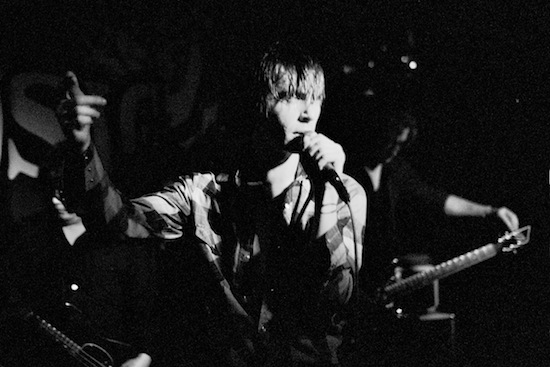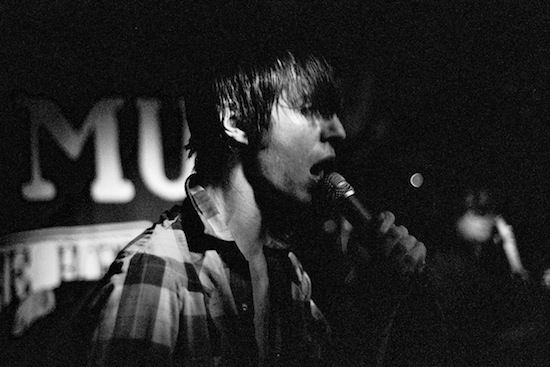The recent sad passing of dear old Uncle Lou has inspired many a weighty proclamation along the lines of, "well, that’s rock music over and done with, move along, nothing to see here anymore, kids today don’t know what it is, it’s not even proper heroin anymore, is it?" Yes, those founding fathers, those pioneers will pass along, and in a decade’s time few, if any, of rock’s "greatest generation" will still be standing. That’s life, and death. But there’s surely a smug complacency to choosing, as a result, to lock the doors, draw the curtains, sneer at the young ‘uns for being brainwashed by "that Britain’s got X Factors tripe" and stomp up to the attic to wallow in scratchy vinyl for the rest of your days.
Never mind the Sex Pistols, granddad; that’s bollocks. Fiery rock & roll remains in rude health, but it requires us to engage with it, to believe in it, to go out and find it and keep kicking it back into life. If the light is dying, then rage against it; do not go gently into that same old shite.
Bad for Lazarus have been around the Brighton scene for a while, but there’s nothing tired or jaded about their set tonight; indeed, the addition of new keyboard player, the blond-bobbed Andrew Knightly, has re-configured and re-energised the group. The DNA of being part of the Eighties Matchbox extended family is still apparent (singer / guitarist Ritchie Fownes is an ex-member, as was the recently departed Dominic Knight), as the guitar riffs of ‘D for Conversation’ skid off-road like out-of-control quad bikes, spattering sonic mud from the stage, and hoarse banshee wails rip from flailing tangles of long greasy hair. But Bad for Lazarus are defiantly their own beast; there’s more funk (‘Get Your Nose’), more surging glam rock tumescence of the New York Dolls / Cheap Trick variety (‘No Cigar’), and even, dare I say it, more melody. Grinning through the chaos, sporting a variety of paisley shirts and floral jackets, the boys come on like the bastard sons of the Pink Fairies hammering an approximation of the first Alice Cooper album, the falsetto harmonies and deceptive complexity of their songs even suggesting Roy Wood’s Move in their early, auto-destructive incarnation, or marvellous post-hardcore misfits Shudder To Think.
If it’s a shame that more people aren’t watching Bad for Lazarus, then it’s a national disgrace that the Icarus Line should find themselves, on a Saturday night in hardly-out-in-the-sticks Brighton, playing to a mere fifty bodies in a pub function room. It’s so disgraceful, in fact, that tonight should have one of those labels ending in ‘gate’ that we stick on especially shameful scandals: ‘Hopegate’ or something. When the Icarus Line last came to town, eight years ago, they headlined the 600-capacity Concorde; one might think that now they would at least sell out a venue a mere quarter of that size, particularly when they’re touring one of the best rock albums of the year, the critically adored Slave Vows.
It’s Slave Vows that is the basis of tonight’s brutal, astonishing 45-minute set, played for all intents and purposes as if it were the debut album of a hungry new band, not battle-scarred veterans of 15 years standing. And indeed, the Icarus Line of 2013 is a very different band to the Icarus Line of 2005, and not just because of line-up changes. But like Swans (and the Icarus Line are one of the few bands at all worthy of comparison), the years of experience have gifted the band a certain gravitas, a carved and careworn dignity, a powerful maturity.
At least the intimate setting gives us the opportunity to observe close up as singer Joe Cardamone appears to will himself into some kind of shamanic trance, while the opening, extended feedback drone of ‘Laying Down For The Man’ builds behind him. An amiable non-drinker offstage, dressed in a simple plaid work shirt and jeans, Cardamone is visibly transfigured into a high dervish priest of raging, enraptured otherness. Eyes rolling back in his head, eyelids flickering, fingertips outstretched in crucifix pose as if trying to reach beyond the veil, gathering ghosts around him.

Pretentious? Maybe; but a certain amount of pretension is surely a prerequisite of all great, transgressive rock music. Hell, it’s pretentious to even try, right? And it’s too easy to accuse Cardamone of simply ripping off Iggy Pop, albeit without the athletics, especially as they share the same slight build, and tonight Cardamone even sports a Lust for Life era haircut. I’ve often theorised, though, that Iggy exists as a separate entity to frail, mortal Jim Osterberg; that ‘Iggy Pop’ is actually some primal god-spirit of chaotic rock n’ roll that Osterberg is able to somehow summon, and be possessed by; and that others, if worthy and prepared to make the sacrifice, could conceivably wear the same mantle.
So Joe Cardamone isn’t just doing Iggy – he has the Ig. Just like the young Nick Cave had the Ig (and sometimes still does), and David Yow in the Jesus Lizard sometimes had the Ig. Cardamone is truly possessed by the Iguana, as he jack-knives his body through ‘Don’t Let Me Save Your Soul,’ hunched and howling, his vocals hitting just that right gut level pitch of animal sex and human contempt / frustrated idealism.

Digital echo supports his Alan Vega screams on Suicide tribute ‘No Money Music,’ but on the tsunami crash of ‘Dead Body’ and elsewhere, the blues are still at the root of the Icarus Line’s music. As with kindred spirits the Stooges, the Birthday Party and Gallon Drunk, they respect the pained spirit of the blues rather than the technique; twisted, tormented and exaggerated, the twin guitars, bass and drums play as one unit, never grandstanding individually, each contributing to the overall air of barely controlled menace and ecstatic release.
And yet, as ‘City Job’ rages, thrashes and convulses, all but turning itself inside out, the release still doesn’t come. The intense energy generated by the band isn’t returned by the audience; in Reichian terms, there’s a blockage. Something just isn’t connecting. Shit is not being lost, and for the life of me, I don’t know why. And so the energy on stage just builds and builds until finally, instead of exploding outward, it collapses in on itself.
"You have to be your own horse," a sweaty Cardamone shrugs afterwards. But then, Cardamone is a believer. We could do with a few more.


